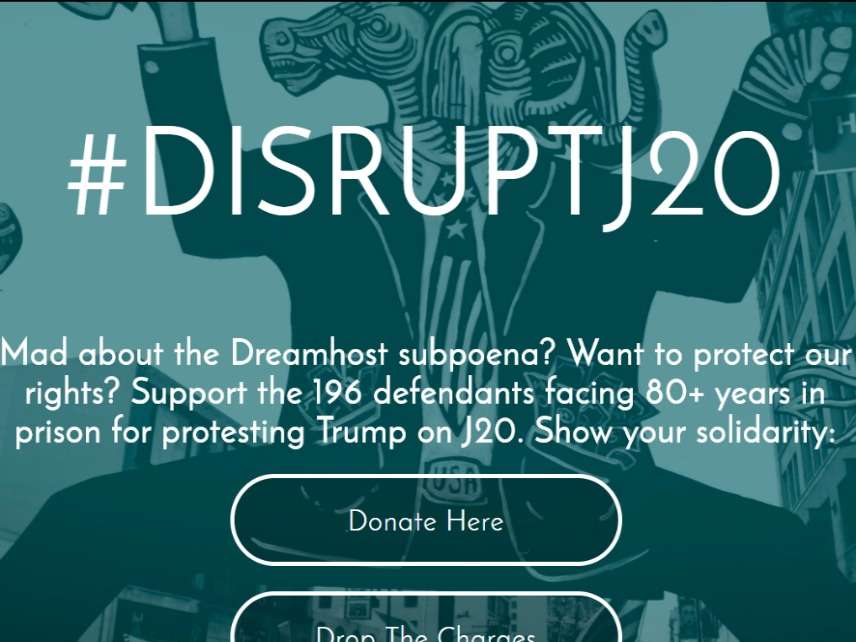DOJ Retreats From Speech-Chilling Demand for Information About Trump's Opponents
Federal prosecutors say they did not realize how broad their warrant was.

Yesterday the Justice Department retreated from its sweeping demand for information about an anti-Trump website, a dragnet that civil libertarians had criticized as an assault on freedom of speech and freedom of association that was apt to intimidate the president's opponents. Proposing a a less ambitious fishing expedition, two federal prosecutors insisted that "the government values and respects the first amendment right of all Americans to participate in peaceful political protests and to read protected political expression online." The history of this case suggests otherwise.
On July 12, as part of an investigation into Inauguration Day rioting, the U.S. Attorney's Office in Washington, D.C., obtained a search warrant requiring the internet hosting service DreamHost to disclose "all records or other information pertaining to" disruptj20.org, which had helped organize protests in the capital on the day Donald Trump took office. DreamHost objected to the overbreadth of that demand, which it said would include some 1.3 million IP addresses of people who had visited the site, along with email from disruptj20.org discussion groups. Assistant U.S. Attorney John Borchert showed no interest in negotiating narrower terms, instead arguing in a July 28 brief that DreamHost should be forced to comply with the warrant immediately.
DreamHost responded on August 11 with a 60-page brief arguing that the warrant endangers the First Amendment rights of third parties and violates the Fourth Amendment "because it fails to describe the items to be seized with sufficient particularity and because the all-encompassing disclosures it requires are unreasonable." A few days later the company publicly explained that it was taking a stand because the information sought by the government went far beyond the legitimate scope of a criminal investigation. "That information could be used to identify any individuals who used this site to exercise and express political speech protected under the Constitution's First Amendment," it said. "That should be enough to set alarm bells off in anyone's mind. This is, in our opinion, a strong example of investigatory overreach and a clear abuse of government authority."
Yesterday Borchert and another assistant U.S. attorney, Jennifer Kerkhoff, said "the government has no interest in records relating to the 1.3 million IP addresses that are mentioned in DreamHost's numerous press releases and opposition brief." They proposed revising the warrant to make it clear that DreamHost "should not disclose the contents of unpublished draft publications" or "HTTP request and error logs," which include visitors' IP addresses.
Borchert and Kerkhoff said "the warrant was not intended to be used, and will not be used, to 'identify the political dissidents of the current administration,'" as DreamHost alleged. In fact, they said, federal prosecutors did not realize DreamHost would have records that could be used for that purpose. Even if you buy that excuse, which does not reflect well on the technological sophistication of federal prosecutors looking for evidence of criminal activity on the internet, DreamHost's lawyer noted the overbreadth problem in a July 21 email to Borchert, who a week later argued that it should be no barrier to compelling DreamHost's compliance with the warrant. It was only after the negative publicity generated by DreamHost's resistance that Borchert suddenly decided the company's concerns had merit.
In an interview with the London Guardian, Public Citizen attorney Paul Alan Levy dismissed the official explanation for the absurdly broad scope of the original warrant—i.e., that the feds did not realize what kinds of information it covered. Levy said it "defies belief" to suggest that "any competent prosecutor could think that any web host would somehow not retain such sensitive and personal information."
DreamHost called the Justice Department's backtracking "a huge win for internet privacy." But it added that there are some "remaining First and Fourth Amendment issues raised by this warrant," which are scheduled to be addressed at a hearing tomorrow.
